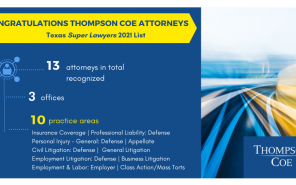Thompson Coe Attorneys Obtain Summary Judgment, Defeating Class Action Motion
Mar 2, 2023
Partners Roger Higgins, Raymond Kutch, and Gino Rossini defeated a Motion for National Class Certification and obtained a Motion for Summary Judgment for all putative class claims for their client, Philadelphia American Life Insurance Company (PALIC).
Background
Philadelphia American Life Insurance Company (“PALIC”) defeated a nationwide class action that was estimated to be in the hundreds of millions of dollars regarding several of its hospital indemnity insurance policies that it writes throughout the United States. Plaintiffs claimed that the language inside a hospital indemnity policy can serve as a basis for alleged misrepresentations about the insurance coverage each policy provides under Chapter 541 of the Texas Insurance Code.
The class policies provided fixed-indemnity hospital benefits for injury or sickness. The case focused on two coverage benefits and whether they provided payment for hospital supplies consumed in surgery: the hospital confinement indemnity coverage and the daily surgery indemnity benefit coverage. The hospital indemnity policies were structured to provide for professional services indemnity in an amount that was determinable by referencing the publicly available Medicare reimbursement rate applicable at the time of care. Under these two coverage grants, PALIC would pay the total amount of fixed-indemnity benefits on a fixed per-day basis and separately pay the total amount of professional services incurred at three times the Medicare rate.
Plaintiffs brought several claims against PALIC under section 541.061 of the Texas Insurance Code and argued that PALIC had misled and did not disclose that the Medicare methodology used for determining payment of the surgical benefits provides a value only for physician services, not surgical supplies.
After extensive discovery, Plaintiffs moved for class certification, and PALIC moved for summary judgment. Notably, the putative class did not contend that PALIC breached the insurance policies. Instead, Plaintiffs argued that the policies contained misrepresentations in their language that would mislead consumers and that the Supreme Court of Texas’ ruling in Menchaca v. USAA permits a policyholder to maintain Texas Insurance Code violations without having to establish a breach of contract.
Analysis
The trial court disagreed with Plaintiffs’ statutory arguments. The court held that when the terms of an insurance policy are clear and unambiguous, a court may not vary those terms. The trial court further explained that Texas’ rules of construction apply with equal force even when interpreting an insurance contract in the context of a statutory tort claim for misrepresentation.
The court next applied the rules of construction and found that the class policies were unambiguous. Plaintiffs were bound to their respective policy terms and charged with knowledge of its conditions and coverage. The court found that the policies’ plain language, when read in context, giving effect to each contractual provision, does not provide coverage for surgical supplies under the daily surgery indemnity benefit, and it would be unreasonable to think otherwise.
The trial court also disagreed with Plaintiffs’ assertion that PALIC’s “referencing supplies as a covered benefit and using supplies in the definition of Medically Necessary was a material misstatement and misled policyholder. The trial court further noted that the policies expressly state that there is no coverage for any service, supplies or treatment that is not a specified benefit described in the covered benefits section of the policies, and the language also excludes any service, supplies or treatment that is not medically necessary.
Last, the trial court noted that under Menchaca, when a policy does not give an insured a contractual right to receive the benefits, the insurer’s misrepresentation of the policy’s coverage can constitute a statutory violation that causes actual damages in the amount of the benefits the insured reasonably believed they were entitled to receive. The trial court concluded that the putative classes’ belief that the Daily Surgery Indemnity Benefit included surgical supplies was unreasonable, and it rejected Plaintiffs’ entitled-to-benefits argument.
Having granted PALIC summary judgment in all causes of action brought against it, the trial court denied Plaintiffs’ motion for class certification on that basis.
Gino Rossini was elected to the 5th Court of Appeals Place 11 and joined the bench in January 2025.









